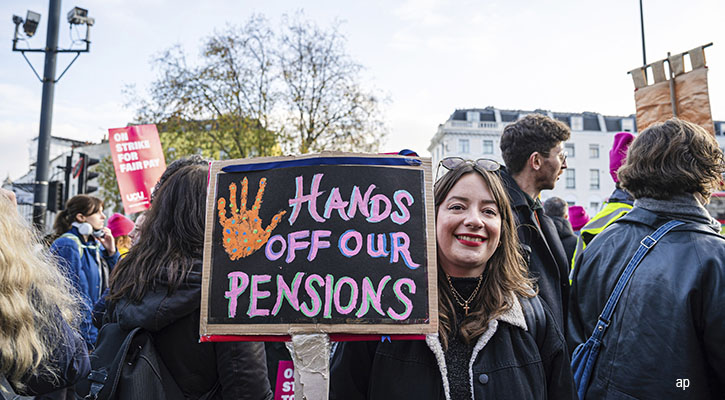
Pensions are a key issue for Britain’s striking workers and their ongoing battle with the government over better terms and conditions. Now French unions look set to join them as the Macron government pushes through legislation to raise the state pension age to 64 by 2030. Alert readers will note that this is still lower than the UK’s retirement age, which will be 67 by that time, having added a year in 2028.
UK workers are expecting an announcement from the government in the next few months about whether the state pension age will be brought forward. Jeremy Hunt, unveiling the Autumn Stamement in November, said that the changes will be made public by May 2023 at the latest, having taken into account “fiscal sustainability, the economic context, the latest life expectancy data and fairness both to pensioners and taxpayers”. The expectation is that this will be bad news – and that a move to 68 in the 2040s will be shifted to the 2030s. Some experts predict the pension age will be 70 in the 2040s.
Another blow to pensioners came today from the PLSA, which has just updated its figures for retritrement living standards to take account of high inflation. All of the categories outlined by the association, covering a minimum, moderate and comfortable retirement, have increased by double digits: respectively these are £12,800 a year (18% higher), £23,300 (up 12%), and £37,300 a year (an 11% increase). Assuming £10,000 a year from the state pension, how else can retireess make up the shortfall? A lot depends on the value of your pension, whether it’s a defined benefit (final salary) scheme, or a defined contribution scheme (effectively a “pot” at retirement).
Annuity rates have bounced as interest rates rise, but £100,000 still buys you between £5,800 and £8,700 a year depending on your age – and that’s single life, level, no guarantee and no inflation link (figures from Hargreaves Lansdown).
So that still leaves a wide gap before many peple reach a “comfortable” retirement level. Other ways to plug that include (for the lucky) property and investment income, and part-time work.
There are some competing trends in the UK population right now: ONS stats show a missing generation of workers between 50 and 70, many of whom are dealing with long-term health issues, whether physical or mental, including the effects of Covid. The pandemic, as well as the radical change to working conditions in its wake, may have pushed people on the brink of retirement to reassess their quality of life.
Logically, the rising cost of living may force these missing employees back into the workforce – boosting their pension contributions and retirement prospects – but there’s scant evidence yet in the employment data. Other factors that will affect pension forecasts include changes to life expectancy, potential trials of four-day weeks, and the trend among young workers to create “portfolio careers”. Auto-enrolment will have also have an impact in the coming decades, meaning workers should rely less on the state in the future.
The government’s Autumn Statement in November made no changes to the pension lifetime allowance (LTA), which is currently just over £1 million and will stay at that level 2025/2026 – and could even be extended until 2028 in the upcoming March Budget.
The chancellor’s balance of factors looks formidable given the state of public finances, high inflation and recession. But state pensioners still look to be a protected species in the now 13-year Conservative reign. There was some anxiety that the “triple lock” – a pledge by the government to increase the state pension by either average earnings, 2.5% or by inflation, whichever is higher – wouldn’t outlast the Truss era. But pensioners will now get 10% in April 2023 as part of a wider inflation-linked uplift to benefits. This means the state pension is now set to top £10,000 (gross) a year for the first time, although tax is then applied at the pensioner’s tax band. This depends on whether you became eligible for the state pension by April 2016, and how many NI contributions you’ve made.









.jpg)
.jpg)

















